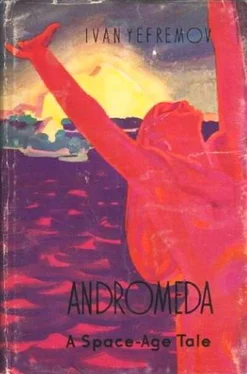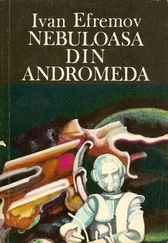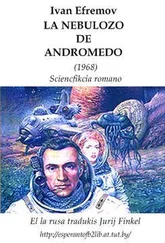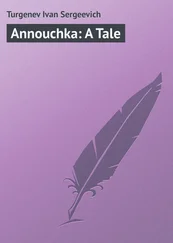Ivan Yefremov - Andromeda (A Space-Age Tale)
Здесь есть возможность читать онлайн «Ivan Yefremov - Andromeda (A Space-Age Tale)» весь текст электронной книги совершенно бесплатно (целиком полную версию без сокращений). В некоторых случаях можно слушать аудио, скачать через торрент в формате fb2 и присутствует краткое содержание. Город: Moscow, Год выпуска: 1959, Издательство: FOREIGN LANGUAGES PUBLISHING HOUSE, Жанр: Фантастика и фэнтези, на английском языке. Описание произведения, (предисловие) а так же отзывы посетителей доступны на портале библиотеки ЛибКат.
- Название:Andromeda (A Space-Age Tale)
- Автор:
- Издательство:FOREIGN LANGUAGES PUBLISHING HOUSE
- Жанр:
- Год:1959
- Город:Moscow
- ISBN:нет данных
- Рейтинг книги:5 / 5. Голосов: 1
-
Избранное:Добавить в избранное
- Отзывы:
-
Ваша оценка:
- 100
- 1
- 2
- 3
- 4
- 5
Andromeda (A Space-Age Tale): краткое содержание, описание и аннотация
Предлагаем к чтению аннотацию, описание, краткое содержание или предисловие (зависит от того, что написал сам автор книги «Andromeda (A Space-Age Tale)»). Если вы не нашли необходимую информацию о книге — напишите в комментариях, мы постараемся отыскать её.
Andromeda (A Space-Age Tale) — читать онлайн бесплатно полную книгу (весь текст) целиком
Ниже представлен текст книги, разбитый по страницам. Система сохранения места последней прочитанной страницы, позволяет с удобством читать онлайн бесплатно книгу «Andromeda (A Space-Age Tale)», без необходимости каждый раз заново искать на чём Вы остановились. Поставьте закладку, и сможете в любой момент перейти на страницу, на которой закончили чтение.
Интервал:
Закладка:
“This star undoubtedly has a planet, even two, I imagine, judging by the curves of the isograve [10] Isograves — lines of equal intensity in a gravitational field (imaginary).
. The planets, as you see,” the commander made a rapid but accurate sketch, “should be big ones and, therefore, should have an atmosphere. We don’t need to land, though, we have enough atomized solid oxygen [11] Atomized Solid Oxygen — oxygen that is not in its usual molecular form (02) but in the form of separate atoms. This form produces more intensive chemical reactions and permits of greater compression than the molecular state.
.”
Erg Noor stopped to gather his thoughts. “We shall become the satellite of the planet and travel in orbit around it. If the atmosphere of the planet is suitable and we use up our air, we have sufficient planetary fuel to land and call for help. In six months we can calculate the direction,” he continued, ‘‘transmit to Earth the results obtained from Zirda and send for a rescue ship and save our ship.”
“If we do save it…” Pour Hyss pulled a wry face as he tried to hide the joy that kindled anew in his heart.
“Yes, if we do,” agreed Erg Noor. “That, however, is clearly our goal. We must muster all our forces to achieve it. You, Pour Hyss and Ingrid Dietra, make your observations and calculate the size of the planets, Bear and Nisa. compute the velocity from the mass of the planets and when you know that compute the orbital velocity of the spaceship and the optimal radiant [12] Optimal Radiant — the optimal radius of the orbit of the spaceship about a planet and outside its atmosphere; the radius that gives ship a constant, unchanging orbit; depends on the volume and mass of the planet (imaginary).
for its revolutions.”
The explorers began to make preparations for a landing should it prove to be necessary. The biologist, the geologist and the physician prepared a reconnaissance robot, the mechanics adjusted the landing locators and searchlights and got ready a rocket satellite that would transmit a message to Earth.
The work went particularly well after the horror and hopelessness they had experienced and was only interrupted by the pitching of the ship in gravitational vortices. Tantra, however, had so reduced her speed that the pitching no longer caused the people great discomfort.
Pour Hyss and Ingrid established the presence of two planets. They had to reject the idea of approaching the outer planet- it was huge in size, cold, encircled by a thick layer of atmosphere that was probably poisonous and threatened them with death. If they had to make a choice of deaths it would probably have been better to burn up on the surface of the iron star than drown in the gloom of an ammonia atmosphere by plunging the ship into a thousand-kilometre thick layer of ammonia ice. There were similar terrible, gigantic planets in the solar system — Jupiter, Saturn, Uranus and Neptune.
Tantra continued to approach the star. In nineteen days they determined the size of the inner planet and it proved to be bigger than Earth. The planet was quite close to its sun, the iron star, and was carried round its orbit at frantic speed, its year being no more than two or three terrestrial months. The invisible star T no doubt made it quite warm with its black rays and, if there was an atmosphere, life could have emerged there. In the latter case landing would be particularly dangerous.
Alien forms of life that had developed under conditions of other planets and by other evolutionary paths and had the albumin cells common to the whole Cosmos were extremely dangerous to Earth-dwellers. The adaptation of the organism to protect itself against harmful refuse and disease bacteria that had been going on for millions of centuries on our planet was powerless against alien forms of life. To the same degree life from other planets was in similar danger on Earth.
The basic activity of animal life — in killing to devour and in devouring to kill — made its appearance with depressingly brutal cruelty when the animal life of different worlds clashed. Fantastic diseases, instantaneous epidemics, the terrible spreading of pests and horrible injuries beset the first explorations of habitable hut uninhabited planets. Worlds that were inhabited by intelligent beings made numerous experiments and preparations before establishing direct spaceship communications. On our Earth, far removed from the central parts of the Galaxy where life abounds, there had been no visitors from the planets of other stars, no representatives of other civilizations. The Astronautical Council had shortly before completed preparations for the reception of visitors from the planets of not too distant stars in the Ophiuchus, Cygnus, Ursa Major and Apus constellations.
Erg Noor, worried by the possibility of meeting with unknown forms of life, ordered the biological means of defence, that he had taken a big supply of in the hope of visiting Vega, to be brought out of the distant store-rooms.
At last Tantra equalized her orbital velocity with that of the planet and then began to revolve around it. The indefinite, dark-brown surface of the planet, or rather, of its atmosphere, with reflections of the bloody-brown sun, could only be seen through the electronic inverter. All members of the expedition were busy at the instruments.
‘“The temperature of the upper layers of the daylight side is 320° on the Kelvin scale [13] Kelvin Scale — a temperature scale beginning from absolute zero which is — 273 °C, or — 459° F. The temperature 320° K is equal to 4- 47 °C. or 116.6° F.
.”
“Rotation about the axis approximately 20 days.” “The locators show the presence of water and land.” ‘‘The thickness of the atmosphere is 1,700 kilometres.”
“The exact mass is 43.2 times Earth’s mass.” The reports followed one another continuously and the nature of the planet was becoming clear.
Erg Noor summarized the figures as they came in and was making preparations to compute the orbit. The planet was a big one, 43.2 times the mass of Earth, and its force of gravity would hold the ship pressed down to the ground. The people would be as helpless as flies on a fly-paper.
The commander recalled the terrible stories he had heard, half legend, half history, of the old spaceships that had, for various reasons, come into contact with the huge planets. In those days the slow ships with low-powered fuel often perished. The end came with a roar of motors and the spasmodic shuddering of a ship that could not get away but remained stuck to the surface of the planet. The ship remained intact but the bones of the people trying to crawl about the ship were broken. The indescribable horror of great weight had been communicated in the fragmentary cries of last reports, in the farewell transmissions.
The crew of Tantra were not menaced by that danger as long as they revolved about the planet. If they had to land on its surface, however, only the strongest people would be able to drag the weight of their own bodies in this, the future haven that was to be theirs for many long years…. Could they keep alive under such conditions — crushed by the great weight, in the eternal darkness of the infrared rays of the black sun, in a dense atmosphere?
Whatever the conditions were, it was a hope of salvation, it did not mean death and, anyway, there was no choice!
Tantra’s orbit drew closer to the outer fringe of the atmosphere. The expedition could not miss the opportunity of investigating a hitherto unknown planet that was comparatively close to Earth. The lighted, or rather, heated side of the planet differed from the night side not only by its much greater temperature but also by the huge agglomerations of electricity that so interfered with the powerful locators that their indications were distorted beyond recognition. Erg Noor decided to study the planet with the help of bomb stations. They sent out a physical research robot and the automatic recorder reported on an astonishing quantity of free oxygen in an atmosphere of neon and nitrogen, the presence of water vapour and a temperature of 12 °C. These were conditions that, in general, were similar to those on Earth. But the pressure of the thick atmosphere was 1.4 times that of normal pressure on Earth and the force of gravity was 2.5 times greater.
Читать дальшеИнтервал:
Закладка:
Похожие книги на «Andromeda (A Space-Age Tale)»
Представляем Вашему вниманию похожие книги на «Andromeda (A Space-Age Tale)» списком для выбора. Мы отобрали схожую по названию и смыслу литературу в надежде предоставить читателям больше вариантов отыскать новые, интересные, ещё непрочитанные произведения.
Обсуждение, отзывы о книге «Andromeda (A Space-Age Tale)» и просто собственные мнения читателей. Оставьте ваши комментарии, напишите, что Вы думаете о произведении, его смысле или главных героях. Укажите что конкретно понравилось, а что нет, и почему Вы так считаете.











